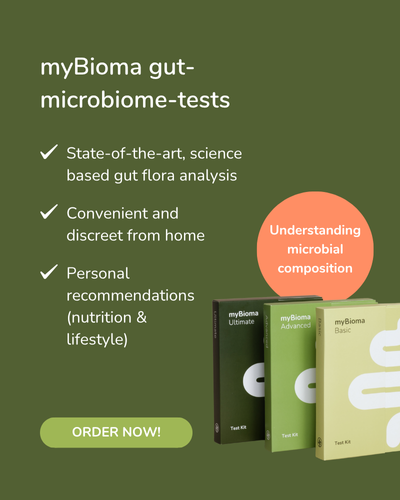Table of contents
- What are LPS?
- The gut as a barrier: Protection against intruders
- Effects of LPS on the body: Inflammation and its symptoms
- Metabolic endotoxemia: A potential cause of various diseases?
- How does an excess of LPS occur in the gut?
- How is endotoxemia and high LPS levels diagnosed?
- How do we detect LPS and inflammatory potential at myBioma?
- Therapeutic approaches for endotoxemia due to elevated LPS levels
What are LPS?
Lipopolysaccharides (LPS), also known as endotoxins, are glycolipids (carbohydrate-lipid compounds) that form the outermost layer of gram-negative bacteria and protect them from harmful substances. LPS are released both during the normal metabolic processes of bacteria and upon their death. If the intestinal barrier becomes permeable, LPS can enter the bloodstream, potentially triggering systemic inflammation in different parts of the body (1).
Gram-negative bacteria, and thus also LPS, naturally occur in the gut. As long as they don't dominate, this is completely normal and usually causes no problems. As is often the case, a healthy balance in the gut is key!
The gut as a barrier: Protection against intruders
The intestinal barrier acts as a physical and functional barrier that regulates the exchange of substances between the gut and the body.
In a healthy gut, the intestinal barrier protects against the absorption of undesirable substances into the bloodstream. LPS also largely remain in the intestinal lumen. However, if the intestinal barrier is disrupted, LPS can enter the body unhindered.

If the intestinal wall is damaged or leaky, LPS can enter the body unregulated and cause inflammation.
Increased permeability of the intestinal mucosa can have several causes:
- An imbalance in the gut microbiome (=dysbiosis)
- A diet high in (unhealthy) fat
- Alcohol
- Chronic stress
- Intestinal inflammation
Likewise, with conditions like SIBO or leaky gut, an increased amount of bacteria and their byproducts, such as LPS, can enter the bloodstream (1, 2).
Effects of LPS on the body: Inflammation and its symptoms
If LPS overcome the intestinal barrier and enter the bloodstream, they interact with the innate immune system and trigger inflammation. If the LPS levels in the bloodstream are constantly elevated, this is referred to as chronic inflammation. Inflammatory processes in the body can affect almost all organs and various parts of the body (2, 3, 4).
The following symptoms may indicate chronic inflammation (4, 5, 6):
- Tiredness and fatigue: Persistent tiredness and low energy
- Pain: In joints, muscles or limb pain
- Poor sleep: Restless sleep, difficulty falling asleep, frequent waking
- Digestive problems: Such as bloating, flatulence, changes in stool frequency or consistency
- Brain fog: Difficulty concentrating, memory problems
- Mood swings: Increased irritability, anxiety, depressive moods
- Weight gain or difficulty losing weight
- Insulin resistance
- Increased risk of cardiovascular disease
- Skin problems
- Susceptibility to infection

The symptoms of LPS-induced inflammation can vary.
In more severe cases, LPS can also cause sepsis, septic shock or multiple organ failure (2, 6).
Metabolic endotoxemia: A potential cause of various diseases?
Metabolic endotoxemia refers to the excessive presence of LPS in the bloodstream. Some studies indicate that elevated levels of LPS in the blood are associated with various diseases. Excessive stimulation of the immune system and inflammation can cause cell damage and exacerbate the following diseases:
Metabolic diseases: LPS-induced inflammation promotes lipid metabolism disorders and insulin resistance. This leads to an increased risk of obesity and type 2 diabetes mellitus (7).
Elevated LPS can also play an important role in the development of non-alcoholic fatty liver disease (2, 5, 6).
Neurodegenerative diseases: LPS triggers inflammation in the brain and exacerbate diseases such as Alzheimer's and Parkinson's. It can damage nerve cells, disrupt immune cells and can promote harmful deposits in the brain (5).
Cardiovascular diseases: LPS can lead to fat deposits in cells, promote inflammatory reactions and the formation of atherosclerotic plaques, which increases the risk of heart disease. Additionally, LPS are highly procoagulant and can therefore increase the risk of thrombosis (5, 6).
Inflammatory bowel disease: LPS can change the composition of the gut microbiome, disrupt the barrier function of the intestine and promote inflammatory reactions. This can contribute significantly to the development of inflammatory bowel disease like Chron's disease and ulcerative colitis (8, 6).
How does an excess of LPS occur in the gut?
We now know how LPS enter the bloodstream and what damage it can cause there. But how does it happen that too much LPS form in the intestine?
The reason for too many LPS is usually due to an imbalance (=dysbiosis) in the gut, which is characterized by a decrease in microbial diversity and an increase in gram-negative bacteria such as Bacteroidetes (3).
How is endotoxemia and high LPS levels diagnosed?
There is (still) no standardized test for determining LPS in the gut in clinical practice. However, there are several indirect methods for measuring LPS.
- In blood serum: Some tests measure the LPS level in the blood and use this to draw conclusions about its presence in the gut.
- Through a lactulose-mannitol test or a biopsy: A lactulose-mannitol test or biopsy can assess intestinal permeability. When the gut becomes more permeable, it loses its ability to function as an effective barrier, allowing greater amounts of LPS to pass from the intestines into the bloodstream.
- Certain inflammatory markers: The excessive presence of certain inflammatory markers, which are also measured via the blood, can be seen as indirect evidence of LPS in the body.
- Gut microbiome tests: A stool examination can reveal dysbiosis and an overgrowth of gram-negative bacteria. This also allows indirect conclusions to be drawn about LPS.
While all of these diagnostic methods can provide valuable information, it is important to note that they are indirect procedures. Diagnosis of LPS-related problems usually requires a combination of these tests and interpretation with other clinical findings and symptoms.
How do we detect LPS and inflammatory potential at myBioma?
In our gut microbiome test, we analyze the DNA (= the genetic material) of the bacteria in the gut. All the functions that a particular bacterium can perform are encoded in its DNA. For example, certain signaling pathways that bacteria use to produce the inflammation-promoting LPS. So far, so good.
However, genetic analysis cannot determine whether these genes are active or inactive. This means that while you can identify the presence of genes responsible for certain inflammatory reactions, you cannot tell whether they are actually ‘switched on or off.’
Therefore, we take it a step further with a predictive functional analysis. This analysis allows us to predict, with a high degree of probability, how much LPS is being produced and the corresponding inflammatory potential. The predictive analysis is 95% consistent with the much more time-consuming and resource-intensive metabolomics analysis, in which metabolic products like LPS are measured directly.

Get personalized support from a doctor or nutritionist for your LPS therapy journey!
Therapeutic approaches for endotoxemia due to elevated LPS levels
Several approaches can be taken to combat high LPS levels. Be sure to contact a nutritionist or doctor for advice and support with your treatment.
Cultivating a balanced gut microbiome and a robust gut barrier
Your lifestyle has a major influence on the composition of your gut bacteria and can serve as both a preventative measure and a form of therapy. The goal here is to build and maintain a diverse and balanced microbiome (= no overgrowth of LPS-producing bacteria) as well as a strong intestinal barrier (2, 5, 6, 9, 10, 11):
The right diet:
- High-fiber diet: whole grains, nuts, legumes
- Integrate prebiotic and probiotic foods : chicory, leeks, artichokes, Jerusalem artichokes, rye, oats, yogurt, kimchi, sauerkraut, (milk-) kefir, tempeh
- Avoid very fatty and highly processed foods
- Omega-3 fatty acids: found mainly in fatty fish as well as in linseed and linseed oil, walnuts, algae
- Ginger: Studies show that larger amounts of ginger can help dampen LPS-induced inflammation
Healthy lifestyle:
- Stress management: Through mindfulness training, breathing exercises, yoga, massages
- Sufficient sleep of good quality: Regular bedtime and wake-up times, relaxation techniques before going to bed
- Support your body's detoxification through regular sweating: For example through exercise, sports and sauna sessions
- Avoiding alcohol and smoking
Antibiotics
In the clinical field, antibiotic treatments are commonly used to reduce the number of LPS-producing bacteria. However, this is often challenging because gram-negative bacteria are difficult to combat due to antibiotic resistance. While the selection of appropriate antibiotics can decrease the number of these bacteria, it does not neutralize pre-existing or released LPS. Additionally, this treatment can also adversely affect beneficial bacteria (11).
Further medical interventions
Research is ongoing into additional suitable therapies. However, some of these have not yet been approved for clinical use. Further studies are needed to comprehensively test their safety and effectiveness. We would like to present two promising therapeutic approaches:
Stool transplants are already being used as a therapeutic measure for selected gastrointestinal diseases. Studies suggest that it can also be effective in reducing lipopolysaccharides.
The stool of a healthy donor is transferred into the intestine of the recipient. The healthy bacteria of the donor can thus balance and regulate the microbiome of the recipient (2).
Treatment with intestinal alkaline phosphatase:
Intestinal alkaline phosphatase is an enzyme made by cells in the intestinal wall. It can lower the inflammation caused by LPS in both the intestine and the bloodstream, and it helps to make the intestinal barrier less permeable. Because of these benefits, it is considered a promising treatment. The enzyme removes a phosphate group from LPS, thereby rendering them harmless.
Research is not yet complete, but initial studies on mice show a positive effect from oral intake of IAP (2).
Are you curious about your gut health, the composition of your gut microbiome and how you can strengthen it? Order your myBioma gut microbiome test conveniently to your home today and find out!
References
- (1) Candelli M, Franza L, Pignataro G, Ojetti V, Covino M, Piccioni A, Gasbarrini A, Franceschi F. Interaction between Lipopolysaccharide and Gut Microbiota in Inflammatory Bowel Diseases. Int J Mol Sci. 2021 Jun 10;22(12):6242. doi: 10.3390/ijms22126242. PMID: 34200555; PMCID: PMC8226948.
- (2) An L, Wirth U, Koch D, Schirren M, Drefs M, Koliogiannis D, Nieß H, Andrassy J, Guba M, Bazhin AV, Werner J, Kühn F. The Role of Gut-Derived Lipopolysaccharides and the Intestinal Barrier in Fatty Liver Diseases. J Gastrointest Surg. 2022 Mar;26(3):671-683. doi: 10.1007/s11605-021-05188-7. Epub 2021 Nov 3. PMID: 34734369; PMCID: PMC8926958.
- (3) Violi, F., Cammisotto, V., Bartimoccia, S. et al. Gut-derived low-grade endotoxaemia, atherothrombosis and cardiovascular disease. Nat Rev Cardiol 20, 24–37 (2023). https://doi.org/10.1038/s41569-022-00737-2
- (4) Page MJ, Kell DB, Pretorius E. The Role of Lipopolysaccharide-Induced Cell Signaling in Chronic Inflammation. Chronic Stress (Thousand Oaks). 2022 Feb 8;6:24705470221076390. doi: 10.1177/24705470221076390. PMID: 35155966; PMCID: PMC8829728.
- (5) van Eeden WA, van Hemert AM, Carlier IVE et al. Basal and LPS-stimulated inflammatory markers and the course of individual symptoms of depression. Transl Psychiatry 10, 235 (2020). https://doi.org/10.1038/s41398-020-00920-4
- (6) Heiles B (2023) Lipopolysaccharide (LPS): Understanding the Role in Inflammation and Disease. J Prob Health. 11:321.doi: 10.35248/2329-8901.23.11.321
- (7) Ruze R, Liu T, Zou X, Song J, Chen Y, Xu R, Yin X, Xu Q. Obesity and type 2 diabetes mellitus: connections in epidemiology, pathogenesis, and treatments. Front Endocrinol (Lausanne). 2023 Apr 21;14:1161521. doi: 10.3389/fendo.2023.1161521. PMID: 37152942; PMCID: PMC10161731.
- (8) Li, Q., von Ehrlich-Treuenstätt, V., Schardey, J. et al. Gut Barrier Dysfunction and Bacterial Lipopolysaccharides in Colorectal Cancer. J Gastrointest Surg 27, 1466–1472 (2023). https://doi .org/10.1007/s11605-023-05654-4
- (9) https://www.ifm.org/news-insights/gut-stress-changes-gut-function/
- (10) Lin, Zhonghui, Jiang, Tao, Chen, Miaoling, Ji, Xudong and Wang, Yunsu. "Gut microbiota and sleep: Interaction mechanisms and therapeutic prospects" Open Life Sciences, vol. 19, no. 1, 2024, pp. 20220910. https://doi.org/10.1515/biol-2022-0910
- (11) https://www.rupahealth.com/post/lipopolysaccharides-treatment-strategies









